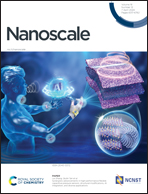Flexible self-supporting inorganic nanofiber membrane-reinforced solid-state electrolyte for dendrite-free lithium metal batteries†
Abstract
Compounding of suitable fillers with PEO-based polymers is the key to forming high-performance electrolytes with robust network structures and homogeneous Li+-transport channels. In this work, we innovatively and efficiently prepared Al2O3 nanofibers and deposited an aqueous dispersion of Al2O3 into a membrane via vacuum filtration to construct a nanofiber membrane with a three-dimensional (3D) network structure as the backbone of a PEO-based solid-state electrolyte. The supporting effect of the nanofiber network structure improved the mechanical properties of the reinforced composite solid-state electrolyte and its ability to inhibit the growth of Li dendrites. Meanwhile, interconnected nanofibers in the PEO-based electrolyte and the strong Lewis acid–base interactions between the chemical groups on the surface of the inorganic filler and the ionic species in the PEO matrix provided facilitated pathways for Li+ transport and regulated the uniform deposition of Li+. Moreover, the interaction between Al2O3 and lithium salts as well as the PEO polymer increased free Li+ concentration and maintained its stable electrochemical properties. Hence, assembled Li/Li symmetric cells achieved a cycle life of more than 2000 h. LFP/Li and NMC811/Li cells provided high discharge specific capacities of up to 146.9 mA h g−1 (0.5C and 50 °C) and 166.9 mA h g−1 (0.25C and 50 °C), respectively. The prepared flexible self-supporting 3D nanofiber network structure construction can provide a simple and efficient new strategy for the exploitation of high-performance solid-state electrolytes.

- This article is part of the themed collection: 2025 Chinese New Year Collection


 Please wait while we load your content...
Please wait while we load your content...